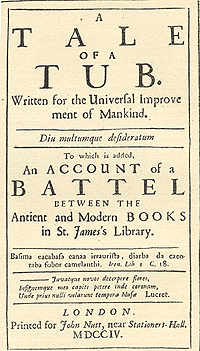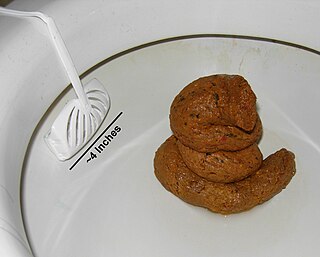
Coprophagia or coprophagy is the consumption of feces. The word is derived from the Ancient Greek κόπρος kópros "feces" and φαγεῖν phageîn "to eat". Coprophagy refers to many kinds of feces-eating, including eating feces of other species (heterospecifics), of other individuals (allocoprophagy), or one's own (autocoprophagy). Feces may be already deposited or taken directly from the anus.

An epigram is a brief, interesting, memorable, sometimes surprising or satirical statement. The word derives from the Greek ἐπίγραμμα. This literary device has been practiced for over two millennia.

Satire is a genre of the visual, literary, and performing arts, usually in the form of fiction and less frequently non-fiction, in which vices, follies, abuses, and shortcomings are held up to ridicule, often with the intent of exposing or shaming the perceived flaws of individuals, corporations, government, or society itself into improvement. Although satire is usually meant to be humorous, its greater purpose is often constructive social criticism, using wit to draw attention to both particular and wider issues in society.

Sexual fetishism or erotic fetishism is a sexual fixation on a nonliving object or body part. The object of interest is called the fetish; the person who has a fetish for that object is a fetishist. A sexual fetish may be regarded as a mental disorder if it causes significant psychosocial distress for the person or has detrimental effects on important areas of their life. Sexual arousal from a particular body part can be further classified as partialism.

Ribaldry or blue comedy is humorous entertainment that ranges from bordering on indelicacy to indecency. Blue comedy is also referred to as "bawdiness" or being "bawdy". Like any humour, ribaldry may be read as conventional or subversive. Ribaldry typically depends on a shared background of sexual conventions and values, and its comedy generally depends on seeing those conventions broken.

Foot fetishism, also known as foot partialism or podophilia, is a pronounced sexual interest in feet. It is the most common form of sexual fetishism for otherwise non-sexual objects or body parts.

A Tale of a Tub was the first major work written by Jonathan Swift, composed between 1694 and 1697 and published in 1704. The Tale is a prose parody divided into sections of "digression" and a "tale" of three brothers, each representing one of the main branches of western Christianity. A satire on the Roman Catholic and Anglican churches and English Dissenters, it was famously attacked for its profanity and irreligion, starting with William Wotton, who wrote that it made a game of "God and Religion, Truth and Moral Honesty, Learning and Industry" to show "at the bottom [the author's] contemptible Opinion of every Thing which is called Christianity." The work continued to be regarded as an attack on religion well into the nineteenth century. One commentator complained that Swift must be "a compulsive cruiser of Dunghils … Ditches, and Common-Shores with a great Affectation [sic] for every thing that is nasty. When he spies any Objects that another Person would avoid looking on, that he Embraces".

The fecal–oral route describes a particular route of transmission of a disease wherein pathogens in fecal particles pass from one person to the mouth of another person. Main causes of fecal–oral disease transmission include lack of adequate sanitation, and poor hygiene practices. If soil or water bodies are polluted with fecal material, humans can be infected with waterborne diseases or soil-transmitted diseases. Fecal contamination of food is another form of fecal-oral transmission. Washing hands properly after changing a baby's diaper or after performing anal hygiene can prevent foodborne illness from spreading.

Absalom and Achitophel is a celebrated satirical poem by John Dryden, written in heroic couplets and first published in 1681. The poem tells the Biblical tale of the rebellion of Absalom against King David; in this context it is an allegory used to represent a story contemporary to Dryden, concerning King Charles II and the Exclusion Crisis (1679–1681). The poem also references the Popish Plot (1678).
A fabliau is a comic, often anonymous tale written by jongleurs in northeast France between c. 1150 and 1400. They are generally characterized by sexual and scatological obscenity, and by a set of contrary attitudes—contrary to the church and to the nobility. Several of them were reworked by Giovanni Boccaccio for the Decameron and by Geoffrey Chaucer for his Canterbury Tales. Some 150 French fabliaux are extant, the number depending on how narrowly fabliau is defined. According to R. Howard Bloch, fabliaux are the first expression of literary realism in Europe.

A masquerade is a Trope (literature) that is used to conceal the identity and certain characteristics of a figure. This concealment has the effect of highlighting some unique or noteworthy aspect of a character or situation, despite its suggested intention of subtlety. There exists the true nature of a character or situation alongside the image that is outwardly displayed and perceived by others in that universe, which can create a layered complexity that adds depth and dimension to the narrative.
Jim McCawley is credited, on page ix of the preface of Studies out in left field as having "created the interdisciplinary field[s] of pornolinguistics and scatolinguistics virtually on his own" in 1967. Technically, scatolinguistics is the study of the words for various forms of excrement. But, given the lack of any cognates such as "pornolinguistics" or "coitolinguistics", it has come to cover the study of all rude and profane expressions.

Restoration literature is the English literature written during the historical period commonly referred to as the English Restoration (1660–1688), which corresponds to the last years of Stuart reign in England, Scotland, Wales, and Ireland. In general, the term is used to denote roughly homogenous styles of literature that centre on a celebration of or reaction to the restored court of Charles II. It is a literature that includes extremes, for it encompasses both Paradise Lost and the Earl of Rochester's Sodom, the high-spirited sexual comedy of The Country Wife and the moral wisdom of The Pilgrim's Progress. It saw Locke's Treatises of Government, the founding of the Royal Society, the experiments and holy meditations of Robert Boyle, the hysterical attacks on theatres from Jeremy Collier, and the pioneering of literary criticism from John Dryden and John Dennis. The period witnessed news becoming a commodity, the essay developing into a periodical art form, and the beginnings of textual criticism.

The Groom of the Stool was the most intimate of an English monarch's courtiers, initially responsible for assisting the king in excretion and hygiene.
John Bon and Mast Parson is a literary work printed in 1547 or 1548 by John Day and William Seres as the work of "Lucas Shepeherd", possibly a pseudonym.

Human feces or faeces British English), commonly and in medical literature more often called stool, are the solid or semisolid remains of food that could not be digested or absorbed in the small intestine of humans, but has been further broken down by bacteria in the large intestine. It also contains bacteria and a relatively small amount of metabolic waste products such as bacterially altered bilirubin, and the dead epithelial cells from the lining of the gut. It is discharged through the anus during a process called defecation.
A parody is a creative work designed to imitate, comment on, and/or mock its subject by means of satirical or ironic imitation. Often its subject is an original work or some aspect of it, but a parody can also be about a real-life person, event, or movement. Literary scholar Professor Simon Dentith defines parody as "any cultural practice which provides a relatively polemical allusive imitation of another cultural production or practice". The literary theorist Linda Hutcheon said "parody ... is imitation, not always at the expense of the parodied text." Parody may be found in art or culture, including literature, music, theater, television and film, animation, and gaming.

Coprophilia, also called scatophilia or scat, is the paraphilia involving sexual arousal and pleasure from feces.

A cuckold is the husband of an adulterous wife; the wife of an adulterous husband is a cuckquean. In biology, a cuckold is a male who unwittingly invests parental effort in juveniles who are not genetically his offspring. A husband who is aware of and tolerates his wife's infidelity is sometimes called a wittol or wittold.

Facesitting, also known as queening or kinging, is a sexual practice with one partner sitting over the other's face, sometimes allowing for oral–genital or oral–anal contact. The sitting partner may face in either direction.














